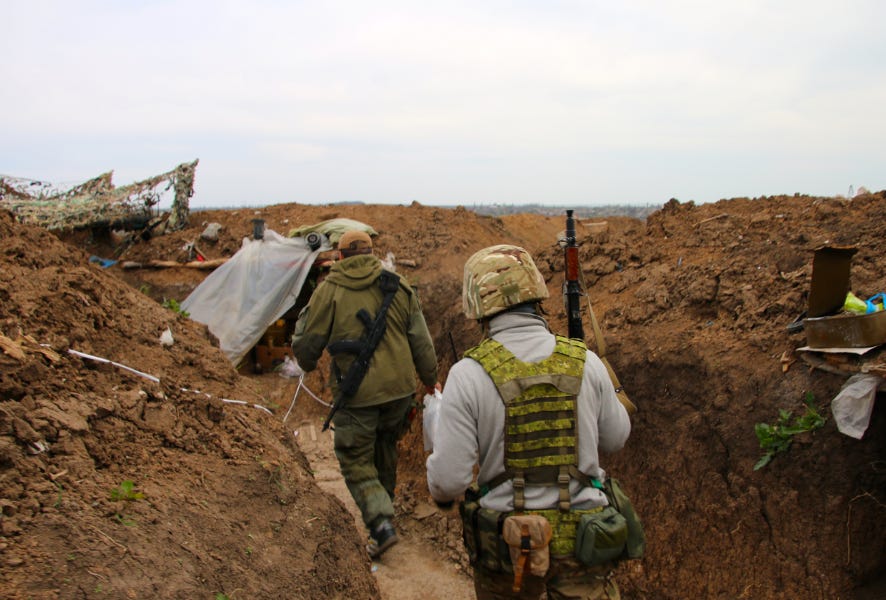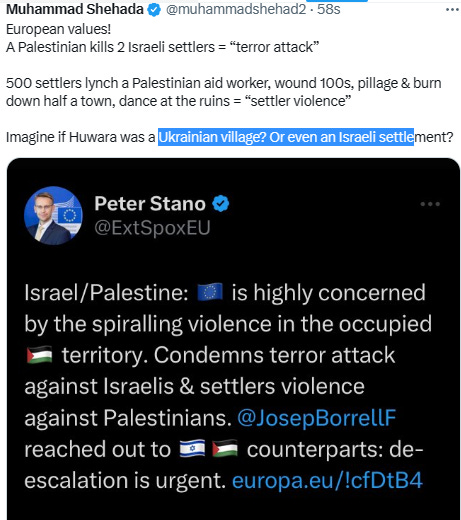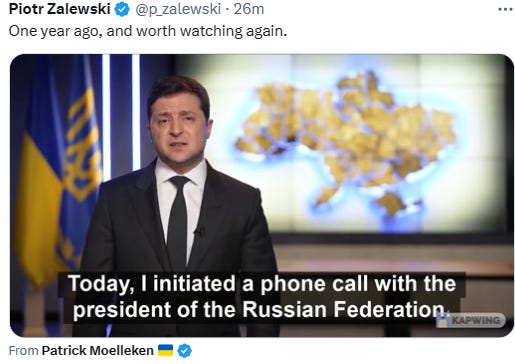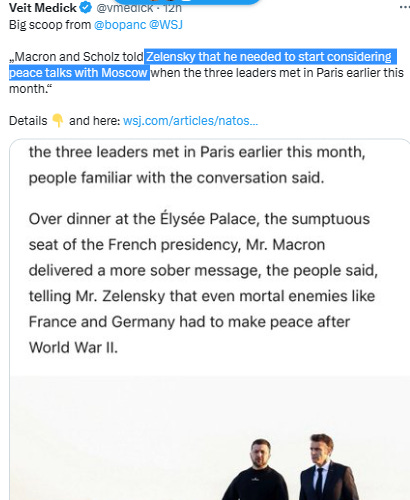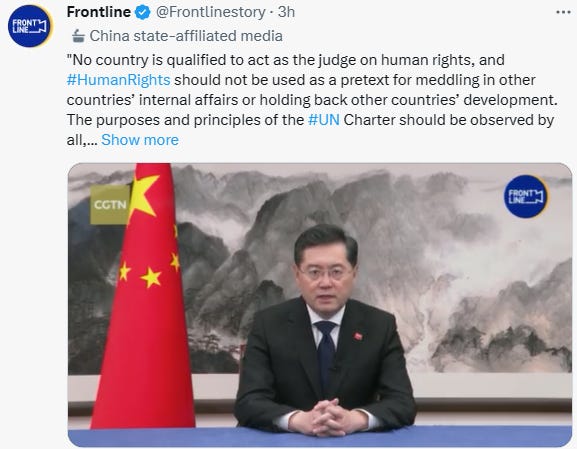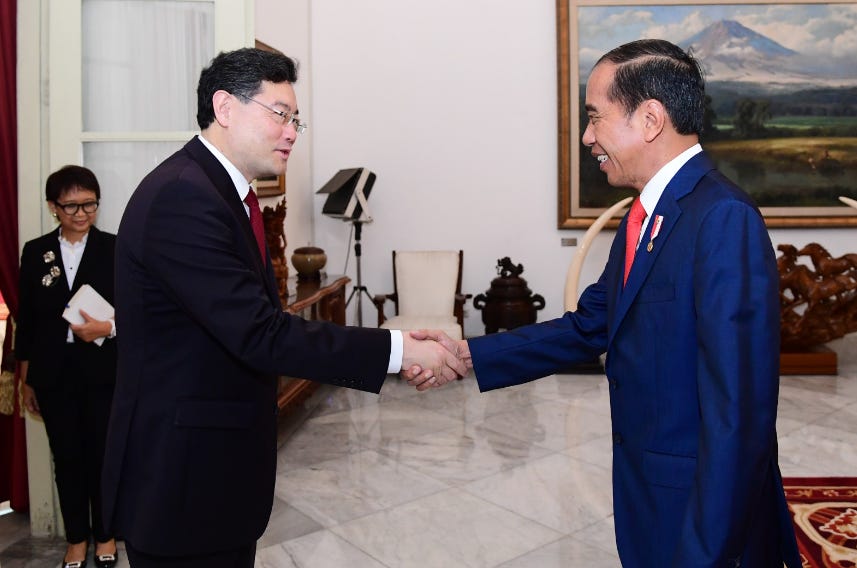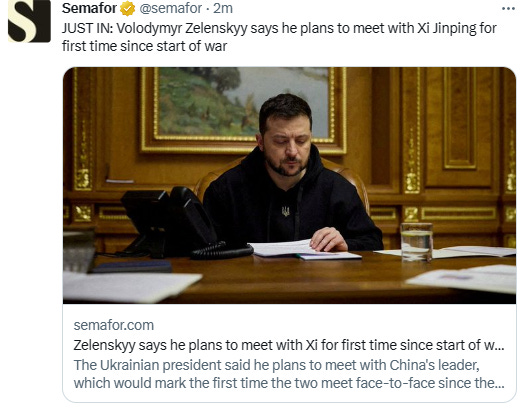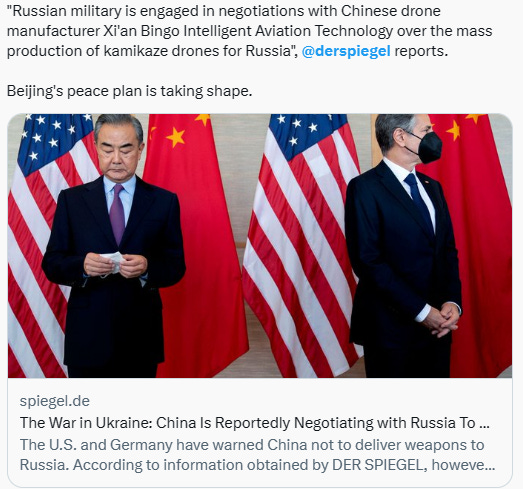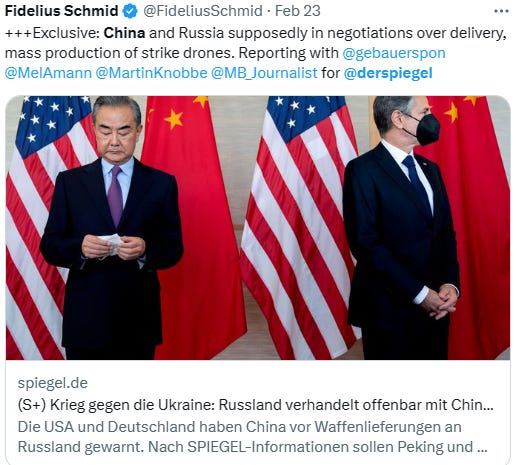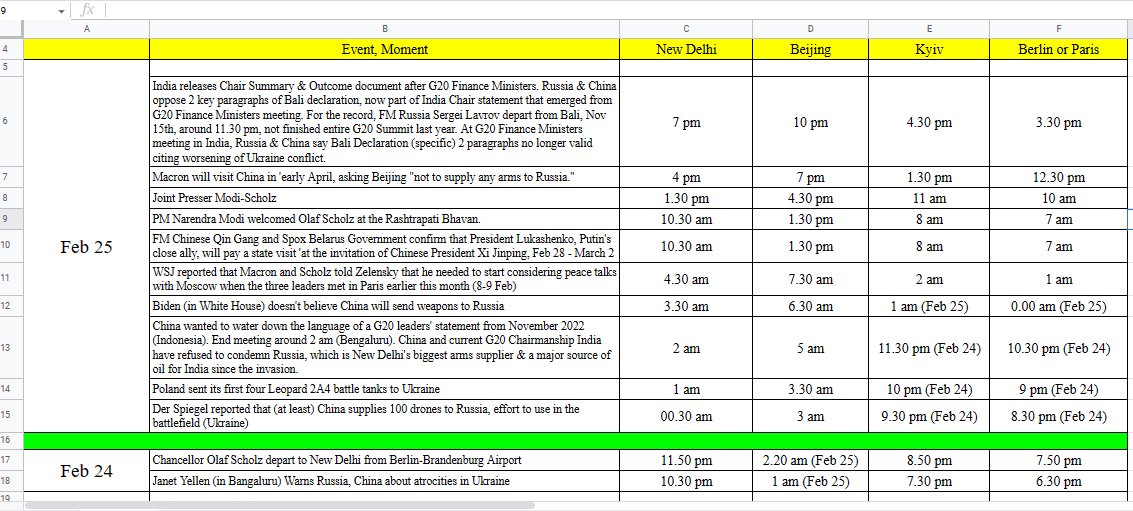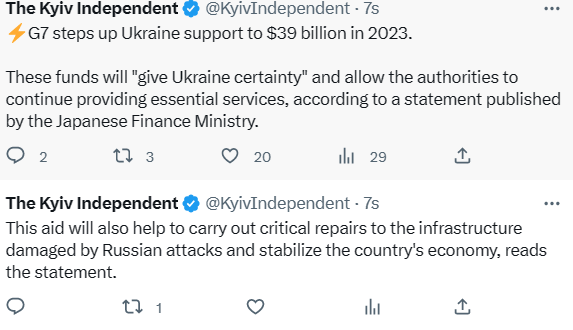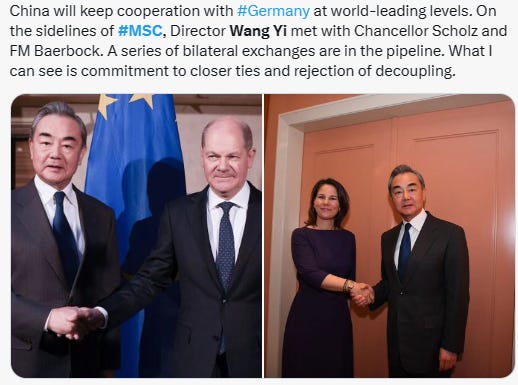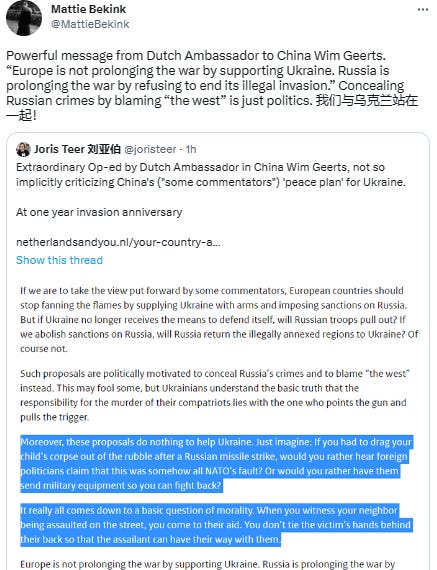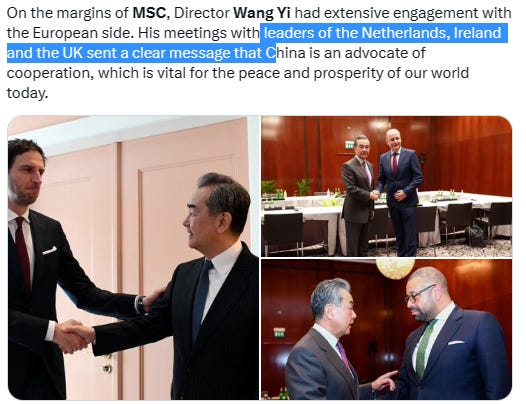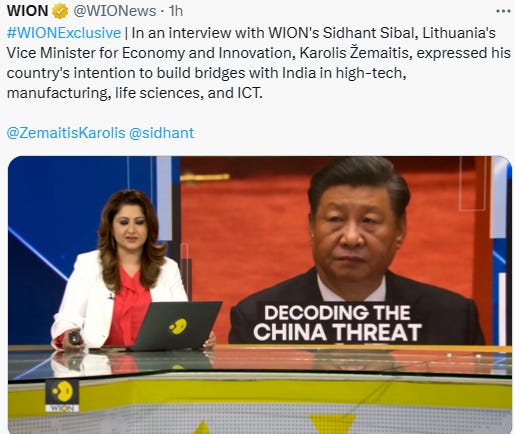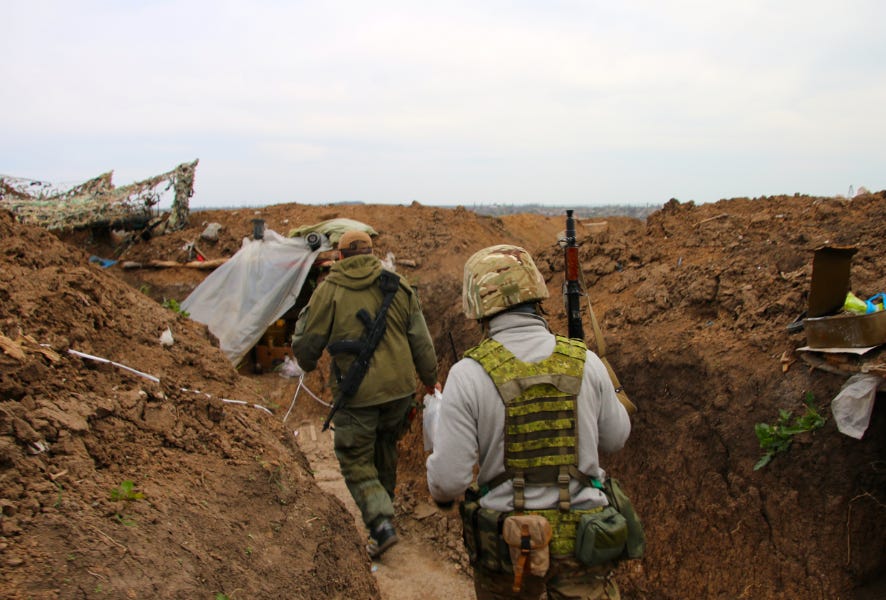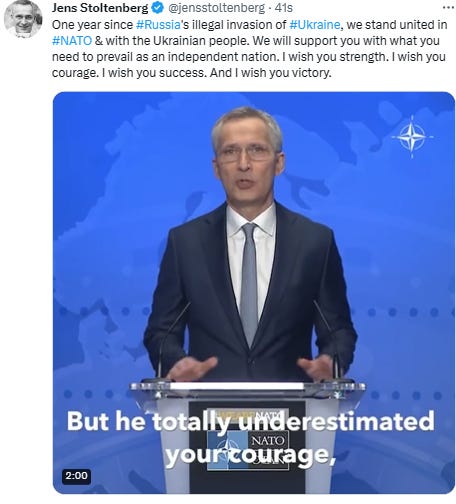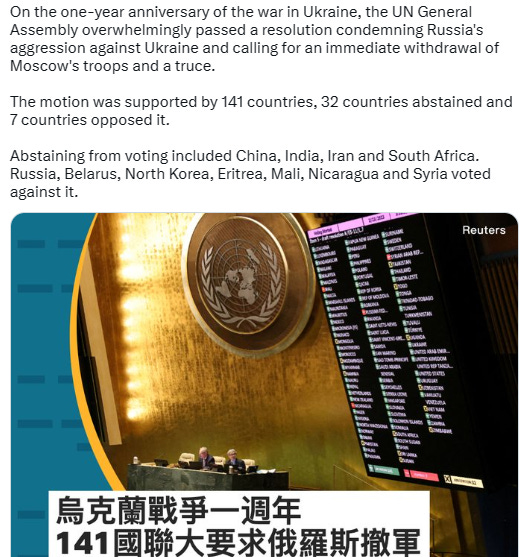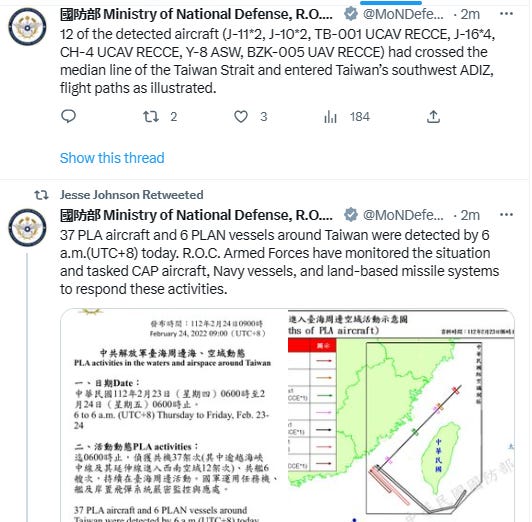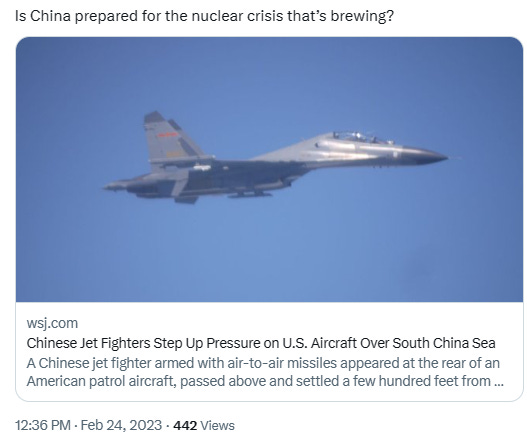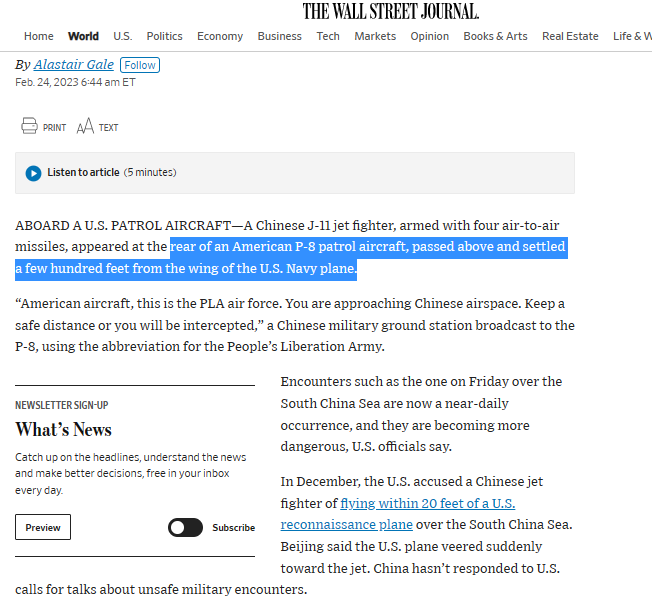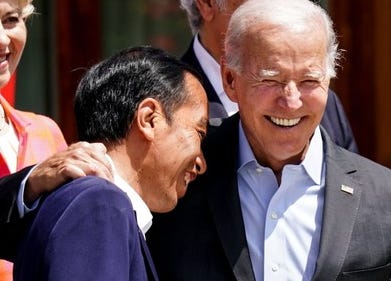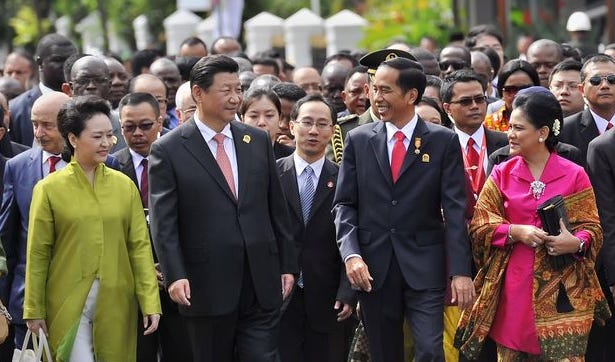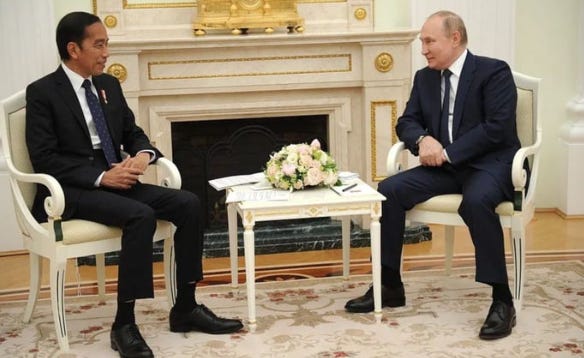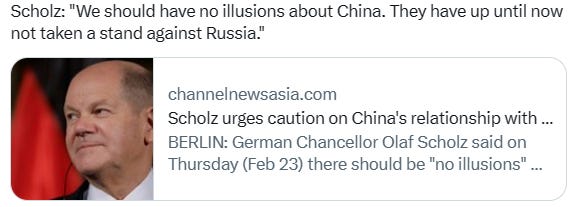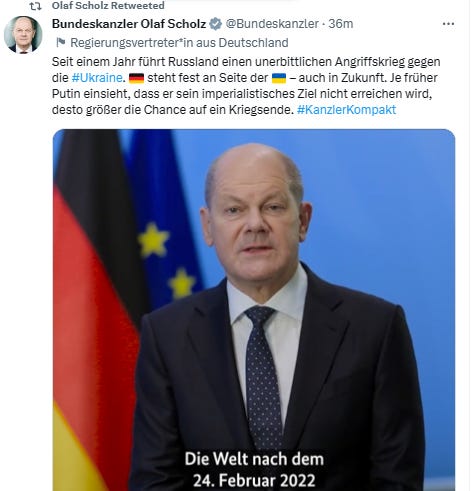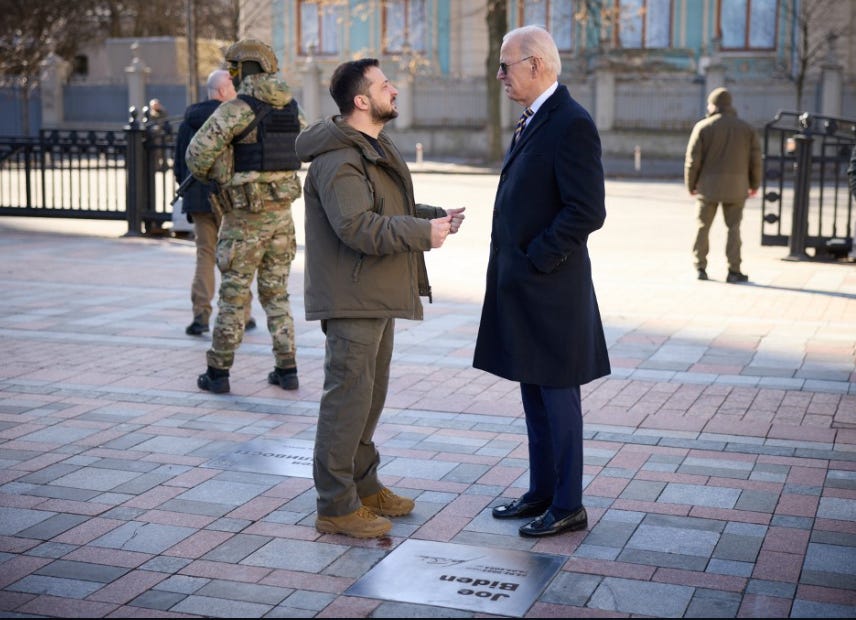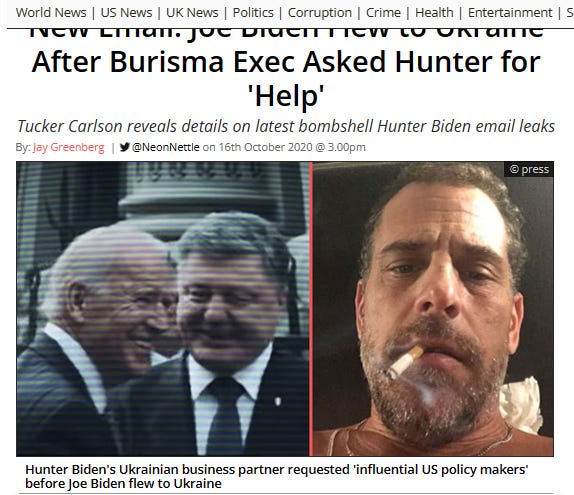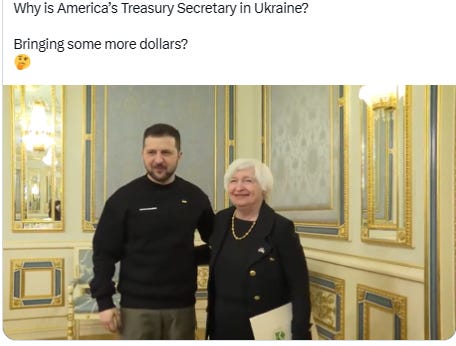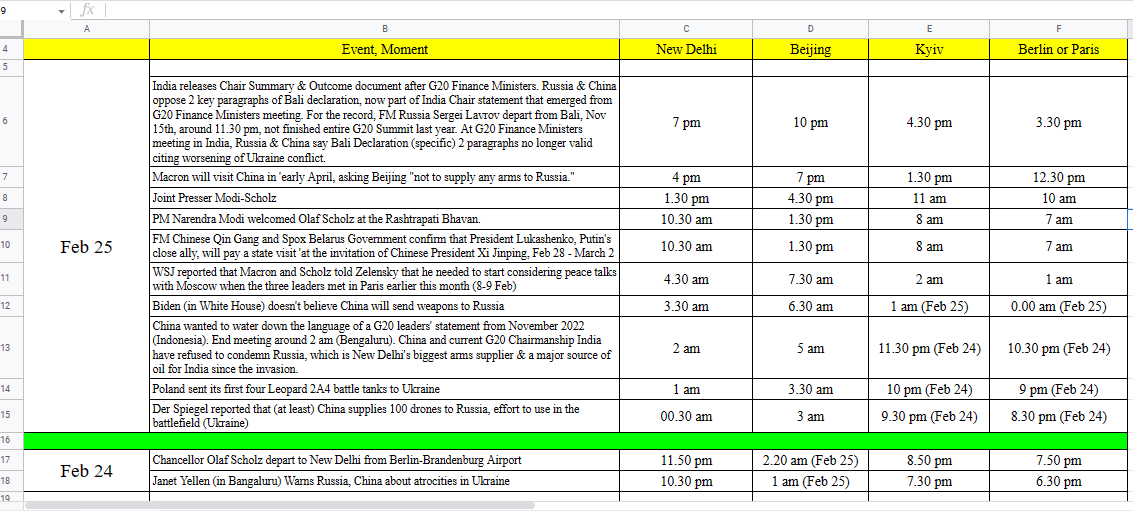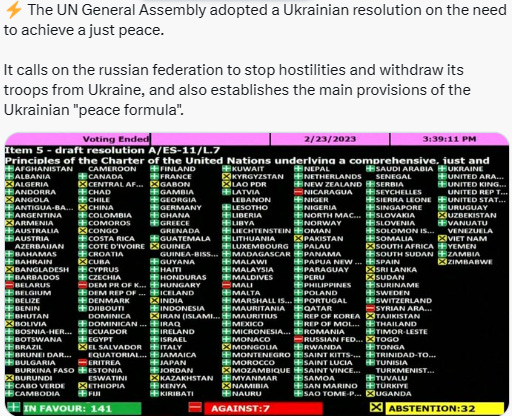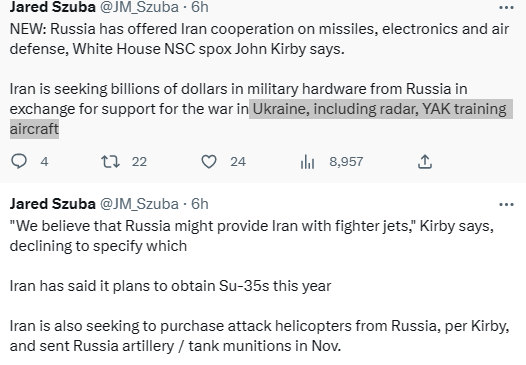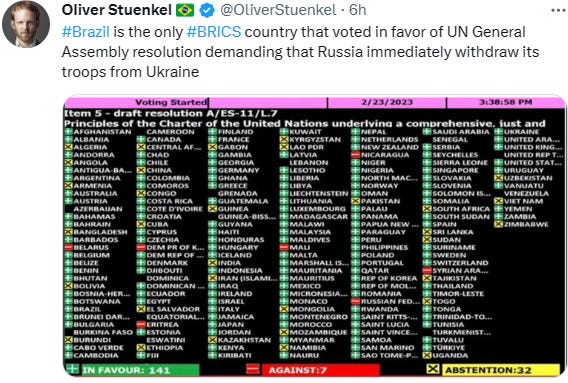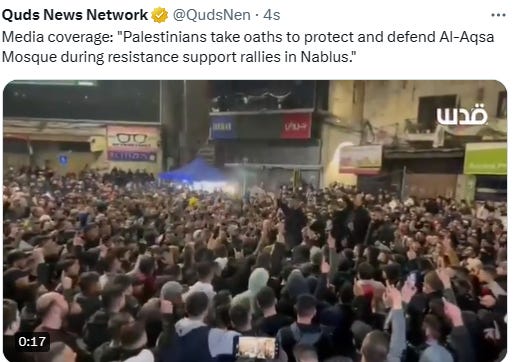(1 hour before first salvo missile by Russia 1 year ago) Thanks China, India, Indonesia and Turkiye. The West Tried to Isolate Russia but Didn’t Work.
Around 4 am in Moscow, or 3 am in Kyiv, or 8 pm in DC, February 24th, 2022. Kremlin started the invasion.
After Russia invaded Ukraine, the West formed what looked like an overwhelming global coalition: 141 countries supported a United Nations measure demanding that Russia unconditionally withdraw. The awkward: since February 24 last year until tonight (just 12 minutes ago, result of UNGA/UN General Assembly voting, every voting in UN in 1 year on Ukraine - Russia war always similar: between 135-141. Western powers, Western Allies have failed to move the needle. It was 141 votes in favor last March. Five votes against last time, 7 this time.
By contrast, Russia seemed isolated. North Korea was one of only four countries that backed Russia and rejected the measure.
The warmth of Russia’s and China’s relationship has been on display in the Kremlin as President Vladimir Putin held talks with China’s top diplomat Wang Yi and hailed the importance of the two countries’ cooperation.
Images showed Wang and Putin exchanging a firm handshake and sitting across the table from each other during their meeting on Wednesday (18 hours before UN GA voting on 1st year Ukraine-Russia War). Others showed Wang, the Chinese Communist Party’s most senior foreign policy official, looking relaxed as he walked with Russian Foreign Minister Sergey Lavrov.
(New Chinese FM Qin Gang)
For Putin and entire high ranking in Kremlin, Russia don’t care 141 or more countries isolated them when China already, and very solid, set a “rock partnership” between two countries. The more Western intervene Taiwan issue, the more concrete cooperation between Russia - China.
The West never won over as much of the world as it initially seemed. Another 47 countries abstained or missed the vote, including India and China. Many of those “neutral” nations have since provided crucial economic or diplomatic support for Russia.
Wang’s visit to Moscow – at the end of a tour of a number of European countries – comes nearly a year after Putin ordered troops into neighbouring Ukraine, starting a conflict that has left thousands dead, forced millions to flee and left Ukrainian towns and cities in ruins.
In Munich Security Conference 5 days ago, Wang Yi repeated, warns the West to “not intervene” heated situation in Taiwan.
The 59th edition of the Munich Security Conference (MSC 2023) is taking place in Munich, Germany from February 17 to 19th.
The three-day forum brings together global personalities in the peace and security ecosystem to take stock and discuss the major challenges currently and potentially facing humanity.
Participants include international decision-makers and experts, including heads of state and government, ministers and diverse voices from international organizations, civil society, the private sector and the media. As part of his European tour, Director of the Office of the Central Commission for Foreign Affairs Wang Yi is set to address the MSC 2023 at the invitation of France, Italy, Hungary and Russia.
The invitation speaks volumes about the relationship between China and many European countries. It also shows the fact that the 20-year-old comprehensive strategic partnership between China and the European Union is still strong amid the shocks and tensions encountered in recent times. Moreover, China’s invitation as an admission that the country is really a peacemaker that needs to be involved to help in combating global insecurity.
The MSC is an annual forum dedicated to global, high-impact international security and strategic politics. In the face of change, disorder and geopolitical tensions in the world, Wang Yi is expected to present a Chinese proposal to the conference on promoting world peace and security. His speech will represent President Xi Jinping's vision of common, comprehensive, cooperative and sustainable security. Wang Yi will also explain China's enduring commitment to peaceful development, and China's position on major international issues.
(Violation of territory, according to Taiwan side, only less 3 hours after UNGA voting/United Nation General Assembly voting on Ukraine - Russia 1 year of war)
Wang Yi reiterated this commitment during a meeting with French President Emmanuel Macron on February 15 when he sought his counterpart’s participation in seeking a peaceful resolution to the ongoing Russia-Ukraine war. It is instructive that while France has also aided Ukraine militarily during the ongoing crisis, Macron has not closed the door for a bid to a peaceful settlement to the war.
In fact, Macron has been on the receiving end of his counterparts both at the EU and the North Atlantic Treaty Organization for not condemning President Vladimir Putin hard enough. He is seen as one of the Western leaders who have kept lines of communication with the Kremlin open. Further, he has advocated for negotiations that will result in a win-win outcome for both of the warring parties, and not the U.S. isolationist policy against its geopolitical adversary.
China has also been circumspect, not just in its stand on the Russia-Ukraine crisis, but in other crises that have bedeviled the world in recent times. Even in the current tensions on the Taiwan Straits, the country has not exhibited any belligerence amid extreme provocation the U.S. This is a remarkable stance taking into consideration that China has the might and wherewithal to engage its adversaries militarily in taking back its rightful territories.
But this does not imply that China takes a hands-off approach to global security challenges. The country has contributed immensely to pace initiatives both at a bilateral and multilateral levels. In September 2020, the country marked 30 Years of actively contributing to UN peacekeeping operations, having sent over 40,000 peacekeepers to 25 peacekeeping missions.
Another significance of China’s attendance of the MSC 2023 is the fact that it will be the ‘odd one’ out as the others are ideologically pro-Western. For rather obvious reasons, the MSC cancelled invitations for Russia, which has long been one of the participants.
For many years, the country has actually been the victim of aggressive forces. Consequently, the Chinese had no choice but to fight back to reclaim their country from colonialists and other oppressors.
As a major nation from the developing world, China stands at the center of world peace. Its veto balancing power at the UN Security Council is a safeguard against anarchy and oppression by some powerful countries whose policies are anachronistic to global peace and security.
The creation of the Global Security Initiative by President Xi Jinping has cemented China’s credentials of peaceful development. Less 24 hours after launched Global Security Initiative Concept Paper on behalf Xi Jinping, Chinese FM Qin Gang already met President Indonesia Joko Widodo in Jakarta, nearly same hour when Wang Yi meet Putin. Until 1 year Ukraine - Russia war, only Jokowi (among President, Prime Minister, Chancellor) had already visited Moscow Kremlin (Putin), Zelensky in Kyiv Ukraine, even visited DC & Beijing.
Jokowi has very warm relations with Biden, Xi Jinping, and Putin.
At the request of the US side, China's top diplomat Wang Yi held an informal meeting with US Secretary of State Antony Blinken on Saturday local time on the sidelines of the Munich Security Conference (MSC) where the Chinese official urged the US side to correct its mistakes as its handling of the recent airship incident has damaged to China-US relations.
Wang, director of the Office of the Foreign Affairs Commission of the Communist Party of China (CPC) Central Committee, stated China's solemn position on the airship incident, and told Blinken that the US should face up to and fix the damage inflicted on bilateral relations after the US abused its force and shot down a Chinese civilian airship that strayed into US airspace due to force majeure, according to a statement on the website of the Chinese Foreign Ministry on Sunday.
On Saturday, Wang blasted Washington's reaction to the balloon incident, calling its handling of the matter "hysterical," and apparently violating international norms and conventions.
Considering that the US handling of the incident has caused damage to the bilateral ties, arranging such interaction amid a deteriorating atmosphere was not easy, some Chinese observers said. But the Chinese side still accepted the request from the US side from the point of view of stabilizing the bilateral ties, which will be conducive to the global stability.
Cooperation with any country could be conducted so long as it brings benefits to the people of Indonesia. This is very complicated amid the Russia - Ukraine war, and, in a lot of ways, Indonesia, not so brave like India, currently enjoys very cheap oil from Russia and doesn't worry about sanctions from the West.
After February 5th, 2023 (2 weeks ago), when the embargo on seaborne Russian fuel kicks in, the EU seeks to avoid a supply shock via import diversification. Now, the EU receives most of its fuel from Russia (220 million barrels in 2022). The main replacement is expected from the US & India. Despite curbs, Britain importing oil from Russia via India, a loophole of sanction. India offers a back-door for imports of Russian oil into Britain, new figures suggest, blunting Britain’s efforts to restrict funding for the Kremlin.
And even some of the nations that initially agreed to denounce Russia see the war as somebody else’s problem — and have since started moving toward a more neutral position.
A year on, it’s becoming clearer: While the West’s core coalition remains remarkably solid, it never convinced the rest of the world to isolate Russia.
Instead of cleaving in two, the world has fragmented. A vast middle sees Russia’s invasion as, primarily, a European and American problem. Rather than view it as an existential threat, these countries are largely focused on protecting their own interests amid the economic and geopolitical upheaval caused by the invasion.
The landscape recalls the many neutral states during the Cold War. But the world is now even more interconnected. The scale and complexity of global communications, economic ties and security links offer far more opportunities for the West’s rivals to gain leverage.
On Thursday, the U.N. General Assembly is expected by a large majority to endorse a resolution demanding that Russia unconditionally and immediately withdraw from Ukraine’s territory — but China, South Africa, India and many countries in the global south are likely to continue to abstain, underlining their alienation from what they regard as the West’s war. The result already come 12 minutes ago: The UN General Assembly adopted a resolution that demands Russia leave Ukraine. In favour: 141 Against: 7 Abstentions: 32
(again) Western powers, Western Allies have failed to move the needle. It was 141 votes in favor last March. Five votes against last time, 7 this time.
After 1 year war, here is how Russia is taking advantage.
Getting around sanctions
At first, the West’s economic sanctions seemed like they might undermine Moscow’s ability to sustain the war. A U.S.-led campaign, which included 37 countries, rattled the foundations of Russia’s financial system by freezing its foreign-currency reserves and targeting its main banks.
About Russia, for first. Due to the war and Oil Price Cap from December 2022, the Russian government since the war started already giving a proposal across the world about “very cheap price” Russia energy and commodities. Russia’s Putin knows since before starting the war, that Russia will face boycott or sanction. So far, India enjoyed significant, rocketing oil supply from Russia. “Minister from Russia”, Luhut cited, angry because he claimed that Pertamina already received a proposal from Russia (maybe under Gazprom) about very cheap oil but Pertamina never followed up. In my opinion, Pertamina is really worried that it will be facing a sanction by the Western alliance if Pertamina rubber-stamps Russia's supply.
The rebalancing of the global energy order continues with India flooded with Russian oil.
Russia became the third-largest oil supplier to India in 2022, making up about 15% of total purchases, dragging down OPEC's share to the lowest in more than a decade. Refiners in India, the world's third-biggest oil consumer and importer, have been gorging on Russian oil sold at a discount after some Western companies shunned buying from Moscow following its invasion of Ukraine last February. In 2021, Russia was at the 17th spot supplying about 1% of India's overall imports. Last month India's oil imports from Russia surged to an all-time high of 1.25 million barrels per day (bpd), about a quarter of overall 4.9 million bpd purchase, the data showed.
India's December 2022 oil imports were the highest in seven months as refiners were drawn to Russian oil due to the deeper discounts offered ahead of a Dec. 5 embargo by Europe and a price cap by the European Union and G7 nations to cut Moscow's oil revenue. Members of the Organization of the Petroleum Exporting Countries (OPEC), mainly from the Middle East and Africa, saw their share in India's crude imports shrinking to 64.5% in 2022, from a peak of 87% in 2008, a Reuters analysis of the data since 2006 showed. "India's oil imports from Russia would continue to rise this year as well, mainly because of discounts if there are no further stringent actions by the Western countries targeting Russian oil," said an official at an Indian refiner. Russia remained the top oil supplier to India in December followed by Iraq and Saudi Arabia.
Higher intake of Russian oil reduced India's appetite for African grades, whose share in 2022 imports declined to a 17-year low while that of Latin America plunged to the lowest in 15 years, In April-December, the first nine months of this fiscal year, Russia replaced Saudi Arabia as the second largest oil supplier to India, while Iraq remained on the top spot.
The sanctions blocked key imports like spare parts for aircraft and semiconductors for electronics. And hundreds of companies voluntarily stopped doing business in Russia, leaving regular Russians without Apple retailers or Netflix subscriptions.
But the sanctions have not been as devastating as the West hoped. A handful of countries have filled the gap, increasing exports to Russia well above prewar levels, according to data collected by Silverado Policy Accelerator, a Washington nonprofit. Other countries’ exports decreased when the war began but have since reversed course.
Source: Analysis of trade data from Silverado Policy Accelerator, using data from Global Trade Tracker; U.N. Comtrade; CEIC Data; national statistics databases. Note: A significant increase includes countries with exports to Russia at least 25 percent higher between Aug. to Nov. 2022 than their averages before the invasion, between Jan. 2019 and Jan. 2022. Other countries had increases of less than 25 percent.
China and Turkiye made up most of the export gap on their own.
Chinese passenger vehicles replaced Russia’s past supply from Western manufacturers. China exported more machinery and semiconductors, too. Other goods produced by multinational firms that can no longer be exported directly to Russia are now flowing through post-Soviet states.
Even as Turkiye has sold weapons to Ukraine, President Recep Tayyip Erdogan has opened up an increased flow of goods to Russia, tearing a hole in the Western dam of sanctions.
“We have always maintained a policy of balance between Ukraine and Russia,” Mr. Erdogan said in September, six months after Turkey voted with the United States to denounce Russia’s invasion.
Altogether, after initially falling post-invasion, trade levels have rebounded because enough countries remain willing to trade with Russia.
But Erdogan was true, prove them wrong. Maybe still 3 am in Bali, when a missile hit Przewodow Poland. G7 Members plus EU in Bali set a sideline meeting (in the midst of G20 Summit - Indonesia as chairmanship) since 7 am Bali. In separate occasion, around 8 am (and repeatedly in 1 pm) Erdogan insist that the missile “1000 % not by Russia.” Until Biden himself announce after (emergency) meeting ended around 10 am, that the missile “is not Russia.”
Russia’s total imports
$10 billion$20 billionJan. 2019Feb. 2022Nov. 2022Russia invadesUkraine
Source: Silverado Policy Accelerator Note: Includes data for 98 countries, which account for the vast majority of pre-invasion exports to Russia.
The sanctions could still be devastating to Russia in the long term. They are already stunting foreign investment and starting to drain the government’s coffers. Restrictions on oil trading have forced Russia to cut production. And reorienting the country’s natural gas pipeline infrastructure toward Asia will take years.
But even though Russia’s economy isn’t thriving, it’s strong enough to keep the war going. The International Monetary Fund projected last month that the Russian economy would grow by 0.3 percent this year, a sharp improvement from its previous estimate that it would contract by 2.3 percent.
Buying weapons and components
The United States and its partners have been dispatching ever more lethal weapons and military equipment directly to Ukraine. And they have attempted to cut off Russia’s own supply of military equipment by imposing export controls that prohibit many companies from selling critical technology to Russia.
The weapons have helped Ukraine surprise the world and hold off Russia’s much larger military. At least 40 countries have provided military aid to Ukraine, either by sending offensive weapons or by providing other forms of military aid.
But the effort to deprive Russia of military equipment has been less successful. Russia has found help here, too. North Korea has shipped “a significant number” of artillery shells to Russia, the United States has said.
Iran has provided Russia with unmanned “kamikaze” drones that Moscow has deployed for attacks against civilian infrastructure in Ukraine. And other countries, including China, have continued to supply Russia with dual-use goods like microchips that make their way into military equipment. Like China (because Taiwan issue), Iran set a standard: the more Western intervene domestic chaos in Iran and or sabotage Iran nuclear plant by intel activities, the more Iran set more cooperation with Russia.
North Korea and Iran: Shipped artillery shells, Sold hundreds, of drones.
To be sure, analysts say Russia does appear to be facing a shortage of precision weaponry, like cruise missiles, that require high-tech equipment. And Russian soldiers report a lack of night-vision equipment and surveillance drones on the front line.
Taking advantage of global ambivalence
A lot of world leaders don’t particularly like the idea of one country invading another. But many of them aren’t unhappy to see somebody stand up to the United States, either.
Throughout Africa, Latin America, Asia and the Middle East, many governments with strong official ties to the United States and Europe don’t see the war as a global threat. Instead, they’ve positioned themselves as neutral bystanders or arbiters, preserving as much flexibility as they can.
Reaction to the invasion was mixed in Asia, where more than a third of countries declined to condemn Russia in the initial U.N. vote. While most American allies have fallen in line, Russia has been able to take advantage of trade relationships and friendly public opinion dating to the Cold War.
At the beginning of the invasion, the United States asked India to buy less oil from Russia. Since then, it has softened its stance as India has continually defied alignment with either side. As tensions increase along India’s border with China, experts have said India doesn’t feel it can risk its relationship with Russia — a key source for weapons.
Gulf countries voted alongside the West to condemn Russia, but they have since largely sought to be seen as neutral arbiters.
President Mohamed Bin Zayed of the United Arab Emirates traveled to Russia to meet with President Vladimir V. Putin and said he sought to find a diplomatic solution. He also offered up an Abu Dhabi airfield for the Brittney Griner prisoner exchange.
Dubai, in particular, has become a hub for Russians — a haven for oligarchs and pro-Kremlin elites where Western sanctions cannot reach. Dont forget 7 months, ago, investigation from The Washington Post, UAE spying America.
And Saudi Arabia has said it must pursue its own interests, even if that causes friction in its longstanding relationship with the U.S. Nearly half of African countries abstained or were absent from the vote to condemn Russia, suggesting a growing reluctance in many nations to accept an American narrative of right and wrong. Russia has won friends through relentless propaganda and hard power, with a growing number of countries contracting with Russian mercenaries and buying Russian weapons. In South Africa, ties to Russia go back to Soviet support to end apartheid. Its leaders have seen an opportunity to align more closely with Russia, while filling in trade gaps left by Europe and the United States. But like many other African countries, South Africa appears careful to balance its growing ties with Russia against maintaining a relationship with the West.
Latin America, with its longstanding relationships with the United States, voted largely alongside its northern neighbor to condemn Russia. But cracks have begun to show more prominently in recent months. Colombia recently refused a request from the United States to provide weapons to Ukraine. And when visited by Chancellor Olaf Scholz of Germany last month, President Luis Ignacio Lula da Silva of Brazil declined to speak in support of Ukraine, saying, “I think the reason for the war between Russia and Ukraine needs to be clearer.”
Last May, before being newly re-elected as president of Brazil, Luiz Inacio Lula da Silva claimed that Ukrainian President Volodymyr Zelenskyy and his Russian counterpart, Vladimir Putin, bear equal responsibility for the war in Ukraine.
Yet whether the refusal to pick sides comes from Brazil, South Africa or India, claiming to be “neutral” on Russia’s war of aggression is untenable.
The same is true of individuals. If a passerby saw a man relentlessly beating a child on a street corner, we would expect the witness to try to stop it. Neutrality is out of the question. On the contrary, we would deplore the moral turpitude of inaction.
I am well acquainted with what Putin and his propagandists “actually say.” The major TV channels are full of commentators recommending that countries like Poland, Germany or the United Kingdom be nuked. The Chechen warlord Ramzan Kadyrov, one of Putin’s closes allies, now openly calls for “the fight against Satanism (to) continue throughout Europe and, first of all, on the territory of Poland.”
Indeed, the official Kremlin line describes the war as a “special operation” for the de-Nazification and de-demonization of Ukraine. Among Ukraine’s “provocations” is that it has permitted gay pride parades and allowed LGBTQ rights to undermine traditional sexual norms and gender roles. Kremlin-aligned commentators speak of “liberal totalitarianism,” even going so far as to argue that George Orwell’s “1984” was a critique not of fascism or Stalinism but of liberalism.
One finds nothing like this in the Western media, where the main motif is that we should help Ukraine to survive. As far as I know, nobody has demanded that Russia’s borders be changed or that some part of its territory be seized. At worst, one finds counterproductive demands to boycott Russian culture, as though Putin’s regime somehow represents the likes of Pushkin, Tchaikovsky and Tolstoy. Just as we are supporting Ukraine against an aggressor, so should we defend Russian culture against its abuser in the Kremlin. We also should avoid triumphalism and frame our objective in positive terms. The primary goal is not for Russia to lose and be humiliated, but for Ukraine to survive.
“Neutral” countries outside the West contend that the war is a local conflict that pales in comparison to the horrors of colonialism or more recent events like the U.S. occupation of Iraq. But this is an obvious dodge.
After all, Russia’s imperialist war is itself an act of colonialism. Those who would claim neutrality forfeit their standing to complain about the horrors of colonization anywhere. Waters is a vocal exponent of the Palestinian resistance to Israeli colonization. Why is Ukrainian resistance to Russian colonization any less worthy of support?
Sometimes, things really are as simple as that, especially now that Russia is preparing to celebrate the anniversary of its war with a new offensive. It is obscene to blame Ukraine for Russian acts of destruction or to mischaracterize the Ukrainians’ heroic resistance as a rejection of peace. Those, like Waters, who call for “an immediate cease-fire” would have Ukrainians respond to redoubled Russian aggression by abandoning their own self-defense. That is a formula not for peace, but for pacification.
It bears mentioning — once again — that Russia is counting on the “neutralist” argument eventually to prevail.
Singer Roger Waters is almost right: Ukraine is indeed “provoking” Russia by refusing to submit to its imperial ambitions, even in the face of desperate odds. At this point, the only way that it could stop provoking its aggressive revisionist neighbor would be to lay down and surrender. The same, Waters would agree, is true of Palestine.
But surrendering to imperialism brings neither peace nor justice. To preserve the possibility of achieving either, we must drop the pretense of neutrality and act accordingly.
Trying to weaken the core Western coalition
Several dozen countries make up the core group backing Ukraine by providing military assistance or sanctioning Russia.
39 countries imposed sanctions on Russia or provided military assistance to Ukraine
Western unity during the war has proven remarkable, with countries long seen as relatively friendly toward Russia — like Germany, France and Italy — remaining staunchly behind Ukraine. NATO, declared “braindead” by President Emmanuel Macron of France in 2019, once again serves the clear purpose of protecting the Western alliance from Russian attack.
But even among Western countries, the unity has not been perfect. Hungary has technically sanctioned Russia as a member of the European Union, but under leader Viktor Orban it has been a persistent outlier in support for Ukraine within the E.U. Hungary delayed several E.U. decisions that required unanimous support.
Others that provided Ukraine with military support have declined to impose economic sanctions on Russia.
31 countries imposed sanctions on Russia and provided military assistance to Ukraine
And a much smaller group of countries have done everything: imposed sanctions, provided heavy weapons — such as tanks, armored vehicles and air defense missile systems — and committed at least 0.1 percent of G.D.P. as bilateral aid to Ukraine, according to data from the Kiel Institute for the World Economy.
17 countries have sent heavy weapons and committed more than 0.1% of G.D.P. in aid to Ukraine
As the war passes the one-year mark, Russia’s strategy is clear: to wait out the West. Eventually, Mr. Putin is betting, European countries worried about the war’s toll on their economies and their politics will drop their support for sanctions and weapons deliveries. The countries across Asia, the Middle East and Africa that are already neutral in the conflict will continue to increase trade with Russia.
And perhaps even the United States, with its presidential election next year, will tire of war and will pressure Ukraine to give in to Mr. Putin.
How unified the West can remain — and how much of the world it is able to keep at least partly on its side — could well determine the outcome of the conflict.




